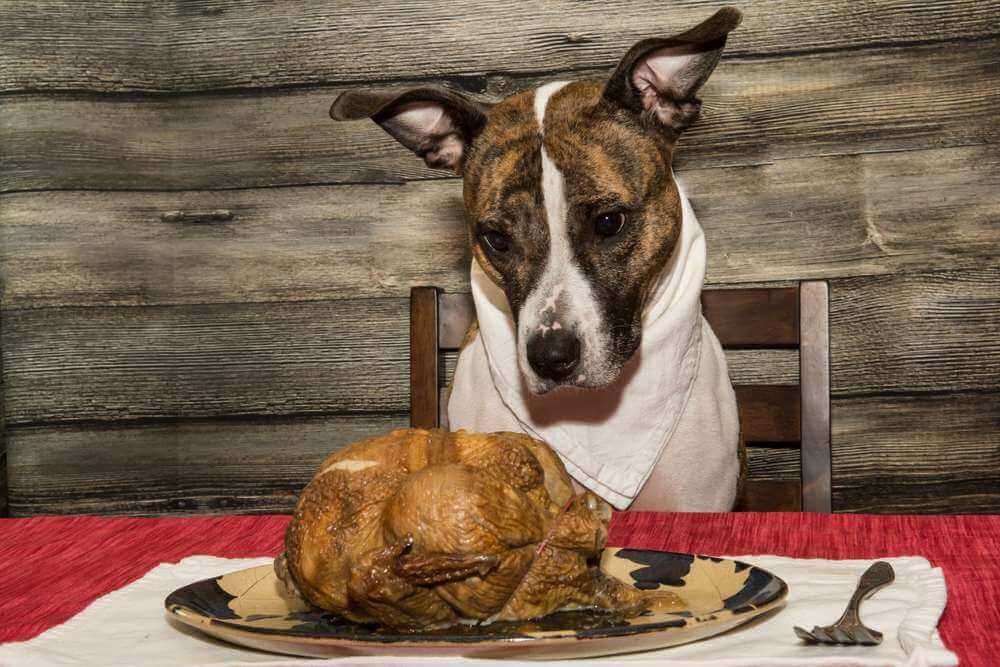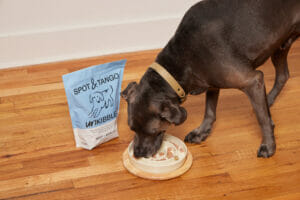Can dogs eat turkey? Turkey is a popular meat, especially around Thanksgiving and Christmas time. If you and your family indulge in some turkey from time to time, you may wonder if you can feed some to your pet.
One of the most common questions researched when it comes to poultry meat is, “Is turkey good for dogs?”
Pet parents don’t just want to know whether this bird’s meat is harmful to dogs or not, but how much is safe for their dog to eat in one meal/snack.
Turkey is a quality protein source and an excellent addition to your dog’s diet! Read on to find out why.
(It’s important to note that while most dogs may be able to eat turkey without any problems, others may suffer from food allergies and may have an adverse reaction to turkey.)
If you think your dog may have some sensitivities, it’s wise to consult your veterinarian before feeding them any meat they aren’t already familiar with.
Is Turkey Good For Dogs?
To answer the question ‘is turkey good for dogs?’, we first have to look at how the turkey has been prepared and whether the ingredients pose a threat to your dog’s health or not.
Turkey meat itself is an excellent source of amino acids, vitamins, and minerals, essential for a dog’s health. It is also protein-rich, packed with essential fatty acids, and is low in saturated fat too.
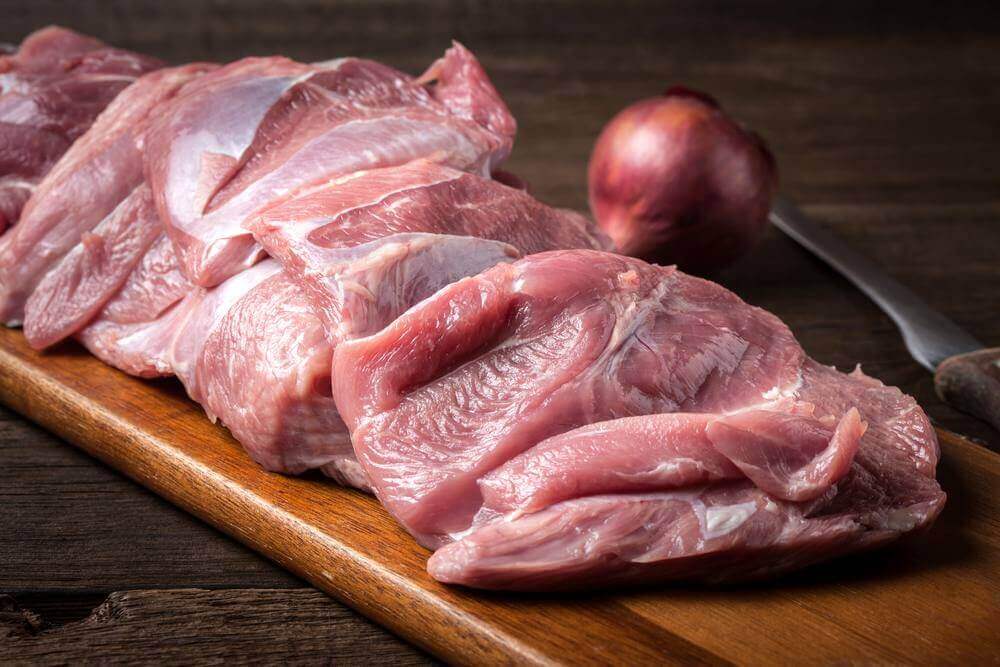
The meat is also rich in minerals such as potassium, magnesium, iron, vitamin A, vitamin E, and B vitamins in abundance. Vitamin B has a good reputation for detoxing the body. It also promotes overall nervous system health and helps stabilize glucose in the blood. Turkey also contains sodium, and in a higher quantity than beef – sodium normalizes metabolism.
With all this nutritional information in mind, you’re sure to be looking for ways to include turkey in your dog’s diet. You can feed freshly prepared turkey to your pet, or get high-quality dog food that includes turkey in the ingredients.
The good news is that, yes, turkey meat is safe for dogs to eat. However, certain factors may affect this statement.
How Should You Feed Your Dog Turkey?
You might be wondering how much turkey is good for dogs. The amount that you feed your pet in one meal should be no more than 50% of the total amount of food served. Considering your dog’s weight, life stage, activity level, and pre-existing health concerns is also important.
Turkey is available in many variations; ground turkey, deli turkey, turkey breast and even raw turkey. Cooked turkey is safe for your pet to eat daily as long as you keep portioning in mind.
Another question that pet parents often ask is, “Is raw turkey safe for dogs to eat?” Most people believe that meat is most useful in its raw form – it contains more animal protein after all, and a dog’s stomach is adapted to digest raw meat. In addition, a dog’s stomach can neutralize any bacteria it might have. However, there’s more to feeding your dog raw meat than that! Raw turkey can contain harmful microorganisms, so it’s a good idea to cook the turkey before feeding it to your pet.
If you’re buying a prepared turkey from a store, you might want to pay attention to how it has been prepared. Many of the herbs and oils used in turkey cooked for humans can cause digestive problems for dogs. But, if turkey meat is prepared blandly (by boiling or dry roasting without oils, additives, spices, or seasonings), then it should be safe for your dog to eat.
If you’re looking into dog food with healthy, human-grade turkey, consider Spot & Tango. Our Turkey & Red Quinoa recipe includes high-quality turkey meat and is free from artificial additives. Plus, we take the guesswork out of portioning – all of our recipes are formulated by our animal nutritionists for your dog’s unique needs!.
Can Dogs Eat Turkey Bones?
Bones are a controversial topic among pet parents. Some swear by them as a treat; others worry about the dangers. So, is it safe or unsafe to allow a dog to eat turkey bones? Although cooked meat is safe for dogs, the bones are not. Any animal bones, whether cooked or raw, can become a choking hazard.
Bird bones, especially, can become very brittle when cooked and can pose certain risks for your pet, as they can splinter and break into sharp shards when chewed. Sharp bone pieces can poke into your dog’s mouth, throat, stomach, and even intestines.
In addition, when a piece of bone gets lodged in your dog’s intestines or stomach, it can result in a blockage that needs to be surgically removed. In less severe cases, it can result in severe constipation. If you give your dog turkey bones, what started out as a fun treat for your dog could turn into an uncomfortable, painful, and expensive emergency!
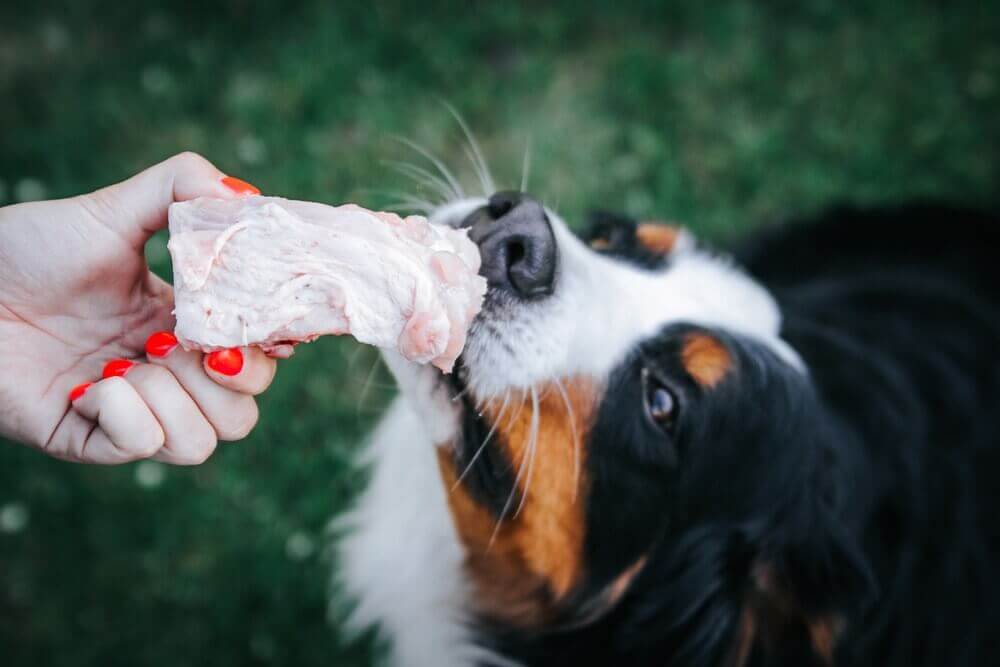
If your dog is lucky enough to eat the turkey bones and escape intestinal damage and constipation, you still may find that the sharp bone fragments cause bleeding and pain when your dog passes a stool. This can be scary for you as a pet parent and uncomfortable for your pet.
The consequences of feeding bones to small puppies can be even more destructive. Their fragile gastrointestinal tract does not digest coarse food well, and feeding them bones can be detrimental to their health.
If you want to feed your dog turkey for the health benefits but don’t have the time to cook and debone it, it’s best to select a premium dog food that contains a high-quality human-grade turkey in the ingredients. Visit Spot & Tango to find out more.
My Dog Already Ate a Turkey Bone: What Should I Do?
Dogs love to chew on bones, but sharp edges and debris can harm their mouths and digestive systems.
If your pet has eaten a bone and subsequently starts acting lethargic, coughing, refuses to eat, and/or trembles in the stomach and body, it’s a sign of a problem.
This is especially the case if there is visible blood in your dog’s stool. These are signs of damage to the digestive system that requires immediate action.
Most young, healthy dogs will recover from these internal injuries on their own, but in some cases, the damage is too severe, and medical care is needed. In all cases, as it’s not entirely possible to tell the severity of your pet’s injuries, it is imperative to consult with your local vet.
Dos and Don’ts if Your Dog Eats a Turkey Bone
What to do if you notice that your dog has eaten a bone:
Dos:
- If your dog eats a bone, don’t immediately stress out. Not all dogs have an adverse reaction to eating bones, and in some instances, everything is just fine. If you are worried, make sure that you keep a watchful eye on your pet. Even if complications do not appear for several days, it is necessary to monitor your pet’s physical condition and reactions carefully.
- Consult with your vet, even if telephonically, so they can provide professional advice.
Don’ts:
- Don’t treat your dog yourself. Medicines should only be used if your local vet has prescribed them.
- Don’t try to make your dog vomit. While vomiting, the sharp bone fragments may tear up the esophagus as it all comes back up.
When Is Turkey Bad For Dogs?
Despite the apparent benefits of this specific poultry meat, like all products, it can have side effects that are harmful to some dogs in certain instances.
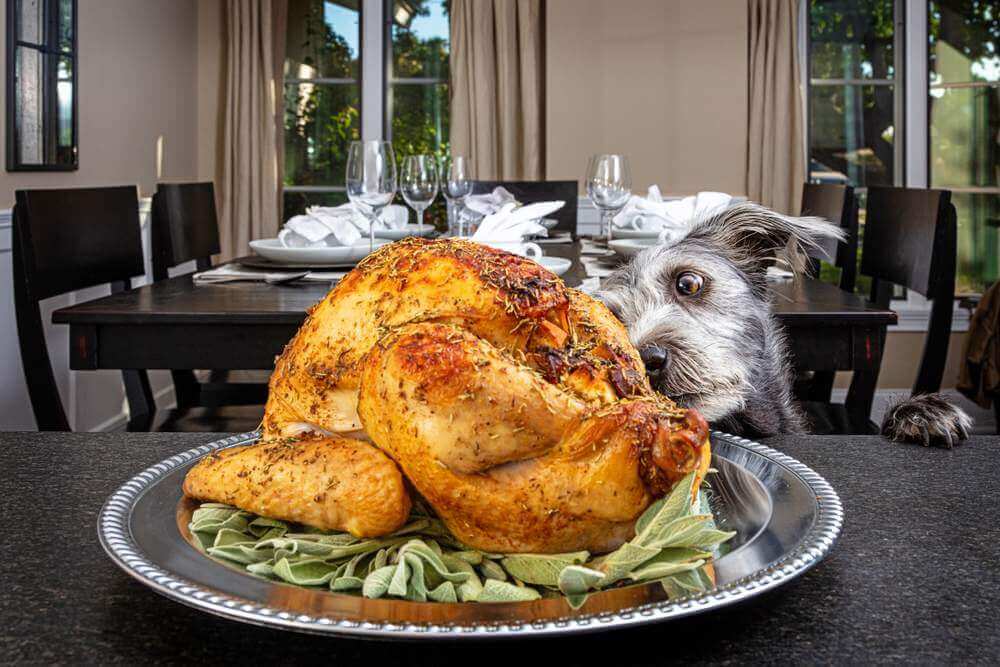
For example, Thanksgiving turkey, which is prepared with many spices and seasonings, can be toxic to dogs. The stuffing inside can also be harmful to dogs, especially since it often contains garlic and onions, which we already mentioned in previous articles are not suitable for dogs to consume.
Frequently Asked Questions:
There’s a lot of misinformation on the internet about whether or not turkey is suitable for dogs to eat.
The following FAQ section may help to answer a few lingering questions you have.
Q. Can dogs eat turkey breast?
Yes. From a health perspective, the fat in a turkey breast is only 3% of a dog’s RDA. The meat obtained from the breast is white meat, thus healthy.
Since it is low in fat content and has high protein levels, this white meat is a highly recommended food for dogs. Turkey breast is easily digestible, making it a practical option even for dogs with delicate stomachs or stomach problems.
Q. Can dogs eat ground turkey?
Yes. Ground meat can be beneficial for dogs if cooked properly and without unnecessary seasoning. It contains natural sources of minerals, including potassium, niacin, and selenium.
Dogs eat ground turkey because it is delicious. Not only is it delicious, but it is also rich in protein. However, you will need to use lean meat if you include it in your dog’s daily diet.
Do not use any seasonings or herbs with ground meat as these can be harmful to dogs. Be sure not to add onion or garlic either. Dogs love the taste of quality meat, so even if you think the meal is bland, simply steaming it is still delicious for your dog.
While the meat itself may be lean, check the food labeling on the ground turkey before purchasing. Some ground meat contains skin, which increases the product’s fat content, making it a poor choice for overweight dogs or dogs with pancreatitis.
Q. Can dogs eat deli turkey?
Yes, dogs can eat deli turkey meat but only in moderation. Deli turkey is highly processed and contains sodium additives, preservatives, and nitrates. Even if you go for a low-sodium type, you’re still exposing your dog to excess sodium that can be harmful to your pet.
Give your dog processed meat only occasionally. Most pet parents treat processed meats as a once-in-a-while treat. American Kennel Club says that it’s unhealthy and can even be dangerous if you feed it to dogs regularly.
With a bit of research, you will find that many deli-style types of meat include flavor agents, chemical additives, preservatives, and even seasonings and spices that can make a dog sick.
So while you may be tempted to give your salivating dog a piece of your deli sandwich, it is better and safer to resist.
Q. Can dogs eat raw turkey?
A dog’s stomach is adapted for the digestion of raw meat. After all, their ancestors did not often have to eat processed food. Raw turkey contains proteins, essential amino acids, and vitamins. Its nutritional value is relatively high. It isn’t easy to find a more suitable protein source for a dog.
As a dog owner, you should be concerned about feeding your dog raw turkey, though, as it could be contaminated with helminths or various bacteria. Raw meat may be contaminated and cause gastrointestinal problems for your pet.
The best way to serve your dog this poultry meat is bland and cooked, or by serving your dog pet food that contains human-grade meat that’s cooked to the right temperature and is correctly packaged and stored before feeding.
Final Thoughts
Can dogs eat turkey? The simple answer is yes. However, it’s best to keep a few things in mind when feeding it to your pet.
To recap, dogs can eat this specific poultry meat, and it is a good alternative for dogs who have a chicken allergy. Plus, it’s somewhat nutritious for dogs.
Many commercial dog food brands include turkey in their recipes, including premium human-grade brands such as Spot & Tango.
This meat can be healthy for your dog if you prepare it properly and give portions sized appropriately for your dog’s age, weight, and breed.
To buy turkey-based dog food that vet nutritionists develop, visit the Spot & Tango website today. You can also make your dog’s personalized meal plan and add other choices to your selection with the multiple option tool.
Expand your dog’s diet and make his meals more balanced and healthier.


